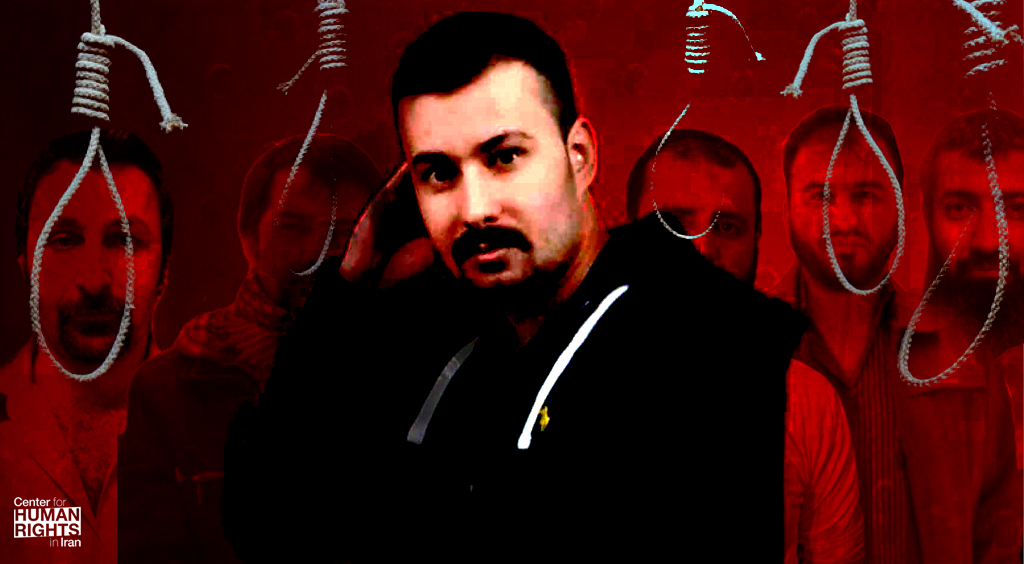Tortured, Now Facing Execution after Sham Trial: Urgent Appeal for Kurdish Political Prisoner in Iran
 “They Hung Me from the Ceiling with Handcuffs”
“They Hung Me from the Ceiling with Handcuffs”
Escalating Political Executions in Iran Demand Strong International Response
May 7, 2024 – In a brief, heart-wrenching visit, the family of Khosrow Besharat, who is incarcerated in Iran’s Qezel Hesar Prison—where mass hunger strikes are ongoing to protest surging and unlawful executions—faced the realization that their loved one, a political prisoner tortured into a coerced “confession,” now faces imminent execution.
“From the moment of his arrest, Khosrow Besharat has been stripped of his rights, denied a fair trial, and subjected to grotesque torture,” said Hadi Ghaemi, executive director of the Center for Human Rights in Iran (CHRI).
“The reality is that the Islamic Republic uses the death penalty for political purposes to instill fear in the society, particularly among their opponents,” Ghaemi said.
“The international community must serve notice to the Iranian authorities that the politically motivated executions and appalling injustices perpetrated within the Islamic Republic’s judicial system will result in severe and intensifying political and economic consequences,” Ghaemi urged.
“The perpetrators of these crimes—from the interrogators who torture unlawfully detained individuals to the judges who convict them in sham trials—must be held accountable,” he added.
Following his family’s 20-minute visit on May 5, Besharat, an ethnic Kurd, was sent to solitary confinement, which is typically a precursor to execution in the Islamic Republic’s judicial system.
Activists from members of minority communities in Iran suffer especially harsh state retribution. They are routinely sentenced to long prison terms after sham trials, and are disproportionally sentenced to death.
- CHRI calls on the Iranian authorities to immediately halt any plans to execute Khosrow Besharat, given the severe violations of Iranian law that have occurred during his prosecution, including the use of torture to extract a false confession.
- CHRI calls on governments worldwide, especially those who oppose the death penalty, to exert pressure on Islamic Republic officials and demand an end to arbitrary death sentences, the torturing of prisoners, and the use of forced “confessions” in trial proceedings. This must be backed by robust diplomatic and economic repercussions.
- Human rights sanctions against complicit judicial officials in the Islamic Republic should be pursued vigorously. Particular focus should be placed on those officials involved in issuing death sentences for political prisoners and prisoners of conscience.
- Countries and international institutions are urged to establish and maintain reliable mechanisms that facilitate the ability of lawyers and human rights activists to safely provide documents and evidence of human rights violations in Iran. Ensuring free and secure access to the internet and providing secure messaging tools are necessary to ensure the transmission of such evidence.
Torture Detailed in Besharat’s Letter from Prison
In September 2020, Besharat, 38, wrote a letter from prison, denying the accusations against him, and detailing torture suffered while held in the Ministry of Intelligence’s detention center in the city of Orumiyeh, West Azerbaijan province.
“It was in February 2010 when I was arrested by the Ministry of Intelligence agents in Mahabad, and they immediately transferred me to the ministry’s detention center in Orumiyeh,” Besharat wrote in a letter from prison in 2020.
“For a whole month, I was kept in solitary confinement and subjected to various kinds of torture… Many times they hung me from the ceiling with handcuffs and hit the soles of my feet with thick electric cables such that I thought my brain was going to come out of my mouth and my eyes out of their sockets and my heart was bursting out of my chest.”
“These tortures continued for three weeks, and after that they threatened me with the arrest of my family members. Under these kinds of torture and threats, the interrogator himself wrote the accusations against me and I was forced to sign and put my fingerprints on the document. I was not fully conscious and did not know what I was signing.”
This Kurdish prisoner of conscience was arrested in February 2010, along with five other men, in connection with the assassination of Abdolrahim Tina, the Friday prayer leader in Mahabad, West Azerbaijan province. They were charged with the catchall, death-sentence carrying charge of “corruption on earth,” and “sympathizing with Salafi (Sunni extremist) groups.”
On May 1, 2024, Besharat’s cousin and co-defendant, Anvar Khezri, was executed. Four fellow co-defendants, Farhad Salimi, Ayoub Karimi, Qasem Abasteh and Davoud Abdollahi, were all executed in the past six months.
All of these death sentences were issued after prosecutions that did not conform to even minimum international standards of due process or fair trial rights.
The defendants were denied the right to choose their own lawyers in all stages of the proceedings, and the death sentences were issued in a series of secretive procedures by Branch 28 and Branch 15 of Iran’s Islamic Revolutionary Court in Tehran, presided by judges Mohammad Moghiseh and Abolqasem Salvati respectively, who are notorious in Iran for issuing harsh sentences based on unsubstantiated charges that have been dictated by state intelligence agents.
Since the 2022 “Women, Life, Freedom” protests that swept across Iran, executions—which are carried out in the Islamic Republic without any semblance of due process—have increased dramatically.
In 2023, 853 executions were recorded, a 48% increase from 2022 and a 172% increase from 2021, according to Amnesty International. In just the first months of 2024, more than 95 executions were recorded. Increasingly, the Islamic Republic is issuing politically motivated death sentences after sham trials against protesters and other critics of state policies.
This report was made possible from donations by readers like you. Help us continue our mission by making a tax-deductible donation.






